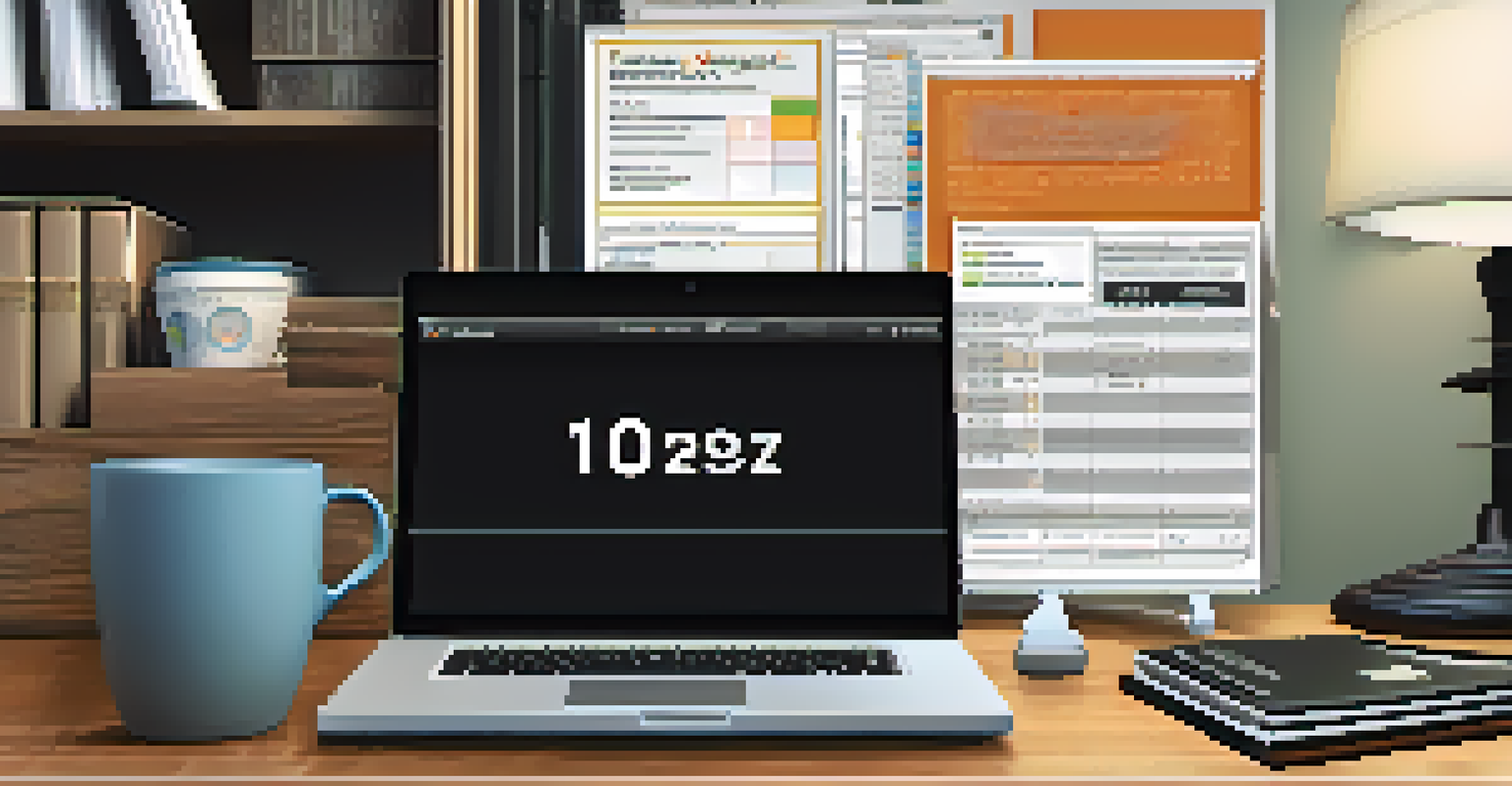What is a 1099 Form? A Comprehensive Overview for Taxpayers

Understanding the 1099 Form and Its Purpose
The 1099 form is a crucial tax document used to report income received by individuals who are not classified as employees. It serves to inform the IRS about various types of income, such as freelance work, interest, dividends, and other non-employment earnings. Essentially, if you've earned money outside of traditional employment, you might receive a 1099 form to help report that income accurately.
In this world, nothing can be said to be certain, except death and taxes.
There are several variations of the 1099 form, each designed for different types of income. For instance, the 1099-MISC is commonly used for independent contractors, while the 1099-INT is for interest income from banks. This variety ensures that taxpayers can report their earnings correctly and helps the IRS track income sources more effectively.
Understanding the 1099 form is essential for taxpayers as it impacts how they file their taxes. Properly reporting this income is vital, as failing to do so can lead to penalties or audits. By knowing what a 1099 form is and its purpose, taxpayers can navigate their tax responsibilities more confidently.
Types of 1099 Forms You Should Know About
There are numerous types of 1099 forms, each tailored for specific income reporting needs. The most common include 1099-MISC for miscellaneous income, 1099-NEC for non-employee compensation, and 1099-DIV for dividends paid to shareholders. Understanding these different forms can help you identify which ones you might receive based on your income sources.

For example, if you worked as a freelancer and earned over $600 from a client, that client is required to issue a 1099-NEC form to report your earnings. Similarly, if you earned interest from your savings account, you would receive a 1099-INT from your bank. Knowing which forms apply to your situation can aid in organizing your tax documents.
Understanding 1099 Forms
The 1099 form is essential for reporting non-employee income to the IRS, helping taxpayers accurately document earnings from freelance work, interest, and dividends.
It's important to note that some forms, like the 1099-K, are used for payments received through third-party networks, such as PayPal or Venmo. Each form has its own reporting thresholds and requirements, making it essential to familiarize yourself with the various types to ensure accurate tax filing.
Who Receives a 1099 Form?
Many individuals may receive a 1099 form, particularly those who are self-employed or earn additional income outside of a regular job. If you provided services as a contractor or freelancer and earned $600 or more from a single client, you should expect to receive a 1099-NEC form from that client. This form is crucial for accurately reporting your earnings on your tax return.
The only thing worse than being blind is having sight but no vision.
Additionally, anyone who earns interest, dividends, or capital gains may receive various types of 1099 forms. For instance, if you have a savings account that pays interest, your bank will send you a 1099-INT at the end of the year detailing the total interest earned. Understanding who receives a 1099 form can help taxpayers recognize their income sources and prepare for tax season.
It's also worth noting that even individuals who earn less than the $600 threshold may receive a 1099 form in some cases, as companies may issue forms for any amount. Therefore, it's essential to keep track of all income, even if it doesn't meet the threshold, to ensure accurate reporting.
How to Report Income from a 1099 Form
Reporting income from a 1099 form is straightforward, yet it requires careful attention to detail. When you receive your 1099 form, you'll want to use the information it provides to fill out your tax return accurately. This includes reporting the income on the appropriate lines of your IRS Form 1040, which is the standard individual tax return.
For self-employed individuals or freelancers, the income reported on the 1099-NEC must also be reported on Schedule C, where you can deduct any business-related expenses. This is a crucial step, as it can significantly reduce your taxable income and ultimately lower your tax bill. Understanding how to report this income properly can save you money and prevent potential issues with the IRS.
Types of 1099 Forms Explained
Different variations of the 1099 form, such as 1099-MISC and 1099-NEC, cater to specific income types, making it important to know which forms apply to your situation.
It's also advisable to keep copies of your 1099 forms and any related documents for your records. This will help you in case of any discrepancies or audits in the future. By maintaining organized records, you can streamline your tax filing process and ensure that you are fully compliant with tax regulations.
Deadlines for 1099 Forms: What You Need to Know
Timeliness is key when it comes to 1099 forms, both for those issuing them and for taxpayers receiving them. Typically, the deadline for businesses to send out 1099 forms to recipients is January 31st of the following tax year. This means that if you provided services in 2023, you should receive your 1099 by January 31, 2024.
Additionally, businesses must also file these forms with the IRS by the end of February if filing by paper or by March 31 if filing electronically. Missing these deadlines can result in penalties for the issuer, so it's important for businesses to stay organized and proactive in their reporting. Taxpayers should remain vigilant about checking their mail for these forms as tax season approaches.
For taxpayers, knowing these deadlines is crucial for timely filing of your tax returns. If you don’t receive your 1099 form by the deadline, it’s a good idea to contact the issuer to ensure it was sent. Staying on top of these deadlines can help reduce stress and ensure that you meet your tax obligations without any last-minute rush.
What to Do If You Don't Receive a 1099 Form
Not receiving a 1099 form when you expect one can be concerning, but there are steps you can take to resolve the issue. First, double-check your records to confirm whether you earned income that should be reported via a 1099 form. If you did, reach out to the payer (the individual or business that should issue the form) to inquire about its status.
Sometimes, payers may have an incorrect address or simply forgot to send the form. In such cases, a polite reminder can often prompt them to issue it promptly. It's also important to remember that even if you don’t receive a 1099 form, you are still required to report the income on your tax return.
Reporting and Deadlines Matter
Timely reporting of income from 1099 forms is crucial, with specific deadlines for both issuers and recipients to avoid penalties and ensure accurate tax filing.
If you are unable to obtain the missing 1099 form, you can report the income using your own records. This might include bank statements, invoices, or any other documentation that reflects the earnings. Keeping thorough records will be beneficial not just for this situation, but for your overall tax preparation.
Common Mistakes to Avoid with 1099 Forms
When it comes to handling 1099 forms, there are several common pitfalls that taxpayers should be aware of. One major mistake is failing to report all received 1099 income, which can lead to penalties from the IRS. It’s vital to report every source of income accurately, even if some amounts seem insignificant.
Another common error is misplacing or losing 1099 forms, which can complicate the tax filing process. To avoid this, it’s a good idea to create a dedicated folder for all tax documents, including 1099 forms, as they arrive. Keeping everything organized can save you time and minimize stress during tax season.

Lastly, many taxpayers overlook the importance of double-checking the information on their 1099 forms for accuracy. Errors in your name, Social Security number, or income amounts can lead to issues with the IRS. Taking a moment to verify this information can help prevent headaches down the line.